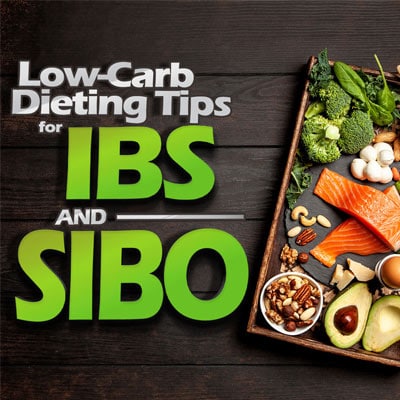Low-Carb Dieting Tips for IBS and SIBO
So you’ve just been diagnosed with small intestine bacterial overgrowth (SIBO) or irritable bowel syndrome (IBS).
Your doctor suggested a diet change. Not just a normal diet either.
You don’t just count calories.
You need to reduce your intake on foods that are usually viewed as “healthy” which makes it really difficult to get started and maintain.
While some doctors will recommend a low-FODMAP diet, here at Atrantil, we prefer a low-carbohydrate diet instead.
Low-FODMAP vs Low-Carb Diet
We talk a lot about prebiotics and a lot of the carbs you’ll be cutting out in the low-FODMAP diet will be types of prebiotics.
FODMAP stands for fermentable oligosaccharide, disaccharide, monosaccharide, and polyols.
Basically, all of these things are fermentable carbohydrates.
With the low-FODMAP diet, it can be excessively restrictive in what you are allowed to eat, to the point that it can be dangerous.
When these non-digestible carbs are being fermented, they release gases.
This is why most doctors recommend limiting foods that contribute to these gases.
However, by limiting so many foods at once, you are at risk of having nutrient deficiencies.
You’ll be getting rid of most fruits, veggies, dairy, and grains.
If low-FODMAP is the diet you and your health care professional find is best for you, then that is great, and you may find it to be beneficial for you.
But for the rest of us, a low-FODMAP diet can be over restrictive.
This is why we recommend a low-carbohydrate diet instead.
While it does limit some foods, it still allows you to eat more foods than the low-FODMAP diet.
How to Make Your Diet Easier and More Successful

Speak With a Registered Dietitian
First things first, when suggesting to speak with a registered dietitian (RD) that means speaking with an RD, not your cousin that got their nutrition certificate online.
RD’s go to extensive schooling, internships, and state testing to earn that title, which means they really know their stuff.
Your RD will work with you on finding trigger foods and how to correctly supplement for them so you aren’t missing out on vital nutrients.
Registered dietitians are also prepared to look out for common issues that go along with restrictive diets including:
- Eating disorders/Fear of certain foods
- Malnutrition
- Anxiety and depression
Look Into Support Groups in Your Area
Going to group meetings may not be something you want to do, as many people don’t enjoy talking about their bathroom habits.
However, it can be extremely beneficial to have a group to keep you accountable.
Over a period of 8 weeks, 17 patients were studied.
14 out of the 17 patients (82%) reported having gut symptom relief while following the group counseling sessions.
Plan and Prepare Your Meals Ahead of Time
Let’s face it, when you’re hungry you don’t want to be worrying about what to eat.
This is why most people don’t end up having successful results with dieting in general.
Low-carb diets really restrict what you can eat, so preparing ahead of time with foods that won’t sidetrack you is crucial to a successful outcome.
Keep a Food Diary
Food diaries are suggested for everything from stomach issues to migraines to autoimmune disorders.
Our food is incredibly important when it comes to health and disease.
Keeping track of your foods and symptoms on a daily basis will help you to see what might be causing your problems.
Tips For the Low-Carb Diet
Swap High-Carb for High-Fiber Foods
Carbs are really what keep you full for longer periods of time.
Think about when you eat at your favorite Italian restaurant — pasta, garlic bread, wine — you stay full forever after a meal like that!
Think about how you feel when you eat a lot of fresh foods, you feel hungry pretty quickly, don’t you?
Try grabbing foods that are high in fiber.
The fiber will take longer to digest so you stay full for longer.
With increased fiber intake, you may be visiting the restroom more frequently, so increase it a little bit at a time to allow your body to adjust.
Pair Fruits and Veggies with Protein
This is a great way to keep your stomach feeling full for longer.
Adding peanut butter to your celery or banana increases your protein for the day and keeps you snacking less while keeping your diet on track.
Plant-based proteins are a better option since they haven’t been linked to organ damage.
Other Treatment Options for IBS/SIBO
The low-FODMAP is the most commonly prescribed treatment for SIBO and IBS, however, there are a ton of other options that work just as well, if not better.
Gut Hypnotherapy
Although this sounds like a joke, it isn’t.
When tested against a low-FODMAP diet gut hypnotherapy held its own. At the 6-week check, it actually had a higher level of success than the diet.
This may be a better option for those who have psychologically-derived IBS.
Gluten-Free and Ketogenic Diets
Although there aren’t many studies in defense of these diets working for SIBO and IBS, people have reported having great success with the gluten-free diet and the keto diet.
This success may be due to eating overall lower amounts of carbs in your diet.
Both of these diets are low-carb but might be easier to stick to since they’re pretty hot trends in the dieting world right now.
The gluten-free diet is for those who have a gluten intolerance.
These people restrict their grain intake which usually helps their problems.
The keto diet is where you eat high amounts of healthy fats and minimal carbs to switch your body’s energy source from carb-derived to fat-derived energy.
While this can be a good thing, the increase of circulating ketones can be dangerous for some people.
Before starting this diet, you should definitely consult your primary care physician.
Medications (Usually Antibiotics)
Rifaximin is the most commonly prescribed antibiotic for SIBO. This makes sense being that you’re trying to get rid of a bacteria.
However, doctors have been known to prescribe it for patients with IBS since the two conditions typically work hand in hand.
The problem with using antibiotics is that it can change your gut microbiome killing necessary bacteria that live there.
Also, antibiotics target only the “normal” bacteria, not the archaebacteria, which are causing all of the problems in the small intestine.
Natural Supplements
This one has been scientifically proven through several studies. Natural supplements work just as well, if not better than traditional medical treatments.
One study pinned Rifamixin up against an herbal treatment.
Both got similar results with the herbal supplement barely trailing the Rifaximin.
Those who failed treatment with Rifaximin went through a washout period and tried the herbal treatment with a 57% success rate.
Atrantil is another herbal supplement that has a fantastic success rate of helping people relieve their bloating, abdominal discomfort and change of bowel habits.
Atrantil is a botanical blend of polyphenols whose different ingredients work together to get rid of the bacteria in the small intestine, which create adverse gases as a byproduct when breaking down carbs.
- Peppermint leaf relaxes, soothes, and reduces inflammation in your gut allowing for the other two products swoop in and save the day.
- Quebracho Colorado soaks up all of the hydrogen gas that has been produced and breaks into the cell walls of the archaebacteria.
- Horse Chestnut goes into the cell wall of the archarebacteria and attacks the enzyme that produces methane. It also targets the regular bacteria to prevent the production of hydrogen.
Synergistically these three powerful polyphenols pack a punch on the root cause of your gastrointestinal issues.
Atrantil has been put up to two trials and passed both with incredible results.
- A double-blind placebo test came out with over 88% success rate for those who were taking Atrantil.
- People who failed at least 4 other forms of treatment were put to the Atrantil test with 80% of the test subjects showing improvement!
The low-FODMAP diet has had a success rate of anywhere between 50-86% throughout different studies.
Atrantil has been consistent at around 80%.
If you haven’t tried Atrantil, talk with your doctor and see if it might be the best solution for you!




My GI dr knows nothing about SIBO let alone treat me for it despite OATS test results. Should I take the Atrantil with anything else, like the FC cidal combo with Low FODMAP or is just Atrantil sufficient?
Hi Kelly,
Thank you for your question. In our clinical trials we had over 80% efficacy with Atrantil alone on those who suffered from bloating and abdominal discomfort, with/without diarrhea, constipation or both. However, we do recommend sticking to a low carb diet and stopping probiotics until you have had relief from your symptoms. Once you have had relief, you can slowly add back in both the carbs and probiotics. We hope this helps to answer your question.
Thank you and best wishes,
Team Atrantil
I am taking atrantil but I am still very constipated
What is the best thing to take
How about Triphala
yes, definitely take triphala, also have a whole beetroot every day, tomatoes also, if you can handle them. Have plenty of herb teas, and look into food combining (don’t mix meat and milk products with anything but vegetables – as in nothing sweet with high protein ingredients). And, you probably should cut out any dairy product except butter. (the milk protein is the part that most likely is adding to major gut slow down).
Will this work if you have a lazy colon? I have to take laxatives once a week to go.
Hi Shannon,
Thank you for your interest in Atrantil.
Atrantil was designed to work on those suffering from bacterial overgrowth in the small intestine. Although, Atrantil does help to get rid of constipation, it only helps with constipation associated with bacterial overgrowth and unfortunately, not other types of motility issues.
We hope this helps to clarify.
Thank you and best wishes,
Team Atrantil
I have duodenal ulcer can I use this? I hope so, I am having bloating and constipation sice being in the hospital with kidney stones and gallbladder surgery and even before then. please help!
Hi Kim,
Thank you for your interest in Atrantil. There is a small amount of peppermint in Atrantil, which may irritate your ulcer.
Therefore, we usually do not recommend it for those who have ulcers. However, you may wish to talk to your health care provider to see if Atrantil is right for you.
Thank you and best wishes,
Team Atrantil
Hi,
I’m waiting for my Atrantil to be delivered. Is there a recommended duration for taking Atrantil? Is it advised to continue use even if I feel better? i.e. with a “maintenance” dose/regime? Or is it recommended to take as described on the bottle with a low-card diet until gut symptoms have been reduced/removed?
Thank you
Sam
Hi Sam!
Thank you for your questions. For best results, we recommend taking 2 capsules 3 times per day, with food, until you have seen relief from your symptoms. Once you have had relief, you can reduce to the maintainence dose of 2-3 capsules every morning, to prevent symptoms from returning and to protect and support the overall digestive system. Also, once symptoms have been relieved, you can slowly add back in the carbs. We hope this helps to clarify.
Best wishes,
Support Team